21st March, 1991, will go down in the history of Pakistan as a pivotal breakthrough
in its leap towards the 21st century and turning point in its march towards national
consolidation. On that day was unraveled a dispute that had been festering in this
part of the subcontinent for the past seventy years. As a follow-up to the meeting
of the Chief Ministers at Lahore on March 3, 1991, a meeting of the representatives
of the four provinces was held at Lahore on March 04, 1991. Another meeting was
held at Karachi on March 16, 1991. The list of participants is attached.
The participants agreed on the following points:-
-
There was an agreement that the issue relating to Apportionment of the Waters of
the Indus River System should be settled as quickly as possible,
-
In the light of the accepted water distributional principles the following apportionment
was agreed to:-
|
PROVINCE
|
KHARIF
|
RABI
|
TOTAL
|
|
PUNJAB
|
37.07
|
18.87
|
55.94
|
|
SINDH
|
33.94
|
14.82
|
48.76
|
Khyber Pakhtunkhwa
(b)
CIVIL CANALS**
|
3.48
1.80
|
2.30
1.20
|
5.78
3.00
|
|
BALOCHISTAN
|
2.85
|
1.02
|
3.87
|
|
TOTAL
|
77.34
+ 1.80
|
37.01
+1.20
|
114.35
+3.00
|
|
*Including already sanctioned Urban and Industrial uses for Metropolitan
Karachi.
**Unguaged Civil Canals above the rim stations.
|
-
N.W.F.P / Baluchistan Projects which are under execution have been provided their
authorized quota of water as existing uses.
-
Balance river supplies (including flood supplies and future storages) shall be distributed
as below:-
|
Punjab
|
SINDH
|
Balochistan
|
NWFP
|
TOTAL
|
|
37%
|
37%
|
12%
|
14%
|
100%
|
|
-
Industrial and Urban Water supplies for Metropolitan city, for which there were
sanctioned allocations will be accorded priority.
-
The need for storages, wherever feasible on the Indus and other rivers was admitted
and recognised by the participants for planned future agricultural development.
-
The need for certain minimum escapage to sea, below Kotri, to check sea instrusion
was recognised. Sindh held the view, that the optimum level was 10 M.A.F., which
was discussed at length, while other studies indicated lower/higher figures. It
was, therefore, decided that further studies would be undertaken to establish the
minimal escapage needs down stream Kotri.
-
There would be no restrictions on the Provinces to undertake new projects within
their agreed shares.
-
No restrictions are placed on small schemes not exceeding 5000 acres above elevation
of 1200 ft. SPD.
-
No restrictions are placed on developing irrigation uses in the Kurram / Gomal /
Kohat basins, so long as these do not adversely affect the existing uses on these
rivers.
-
There are no restrictions on Baluchistan, to develop the water resources of the
Indus right bank tributaries, flowing through its areas.
-
The requirements of LBOD will be met out of the flood supplies In accordance with
the agreed sharing formula.
-
For the implementation of this accord, the need to establish an Indus River System
Authority was recognised and accepted. It would have headquarters at Lahore and
would have representation from all the four provinces.
-
-
The system-wise allocation will be worked out separately, on ten daily basis and
will be attached with this agreement as part and parcel of it.
-
The record of actual average system uses for the period 1977-82, would form the
guide ;line for developing a future regulation pattern. These ten daily uses would
be adjusted pro-prata to correspond to the indicated seasonal allocations of the
different canal systems and would form the basis for sharing shortages and surpluses
on all Pakistan basis.
-
The existing reservoirs would be operated with priority for the irrigation uses
of the Provinces.
-
The provinces will have the freedom within their allocations to modify system-wise
and period-wise uses.
-
All efforts would be made to avoid wastages. Any surpluses may be used by another
province, but this would not establish any rights to such uses.
10 – Day Seasonal System
Wise Adjusted Allocations
Excluding Flood Flows & Future Storages are as Under:-
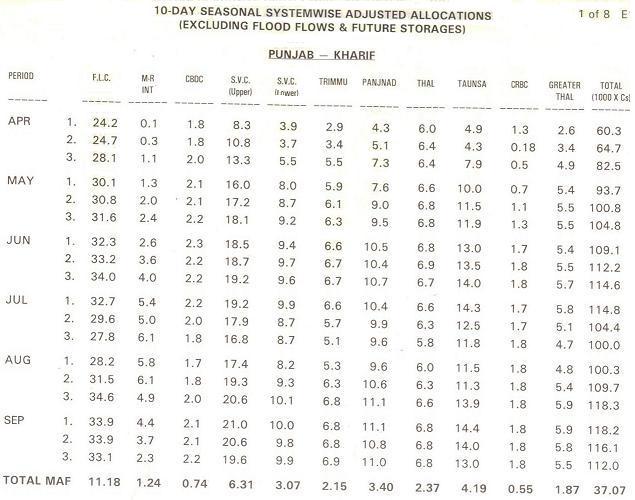
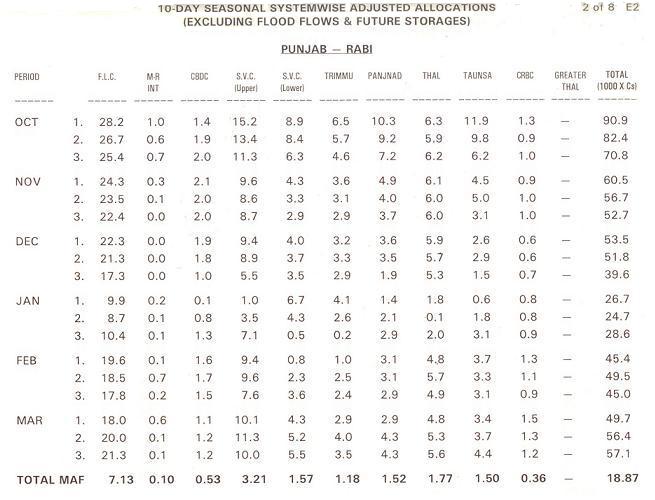
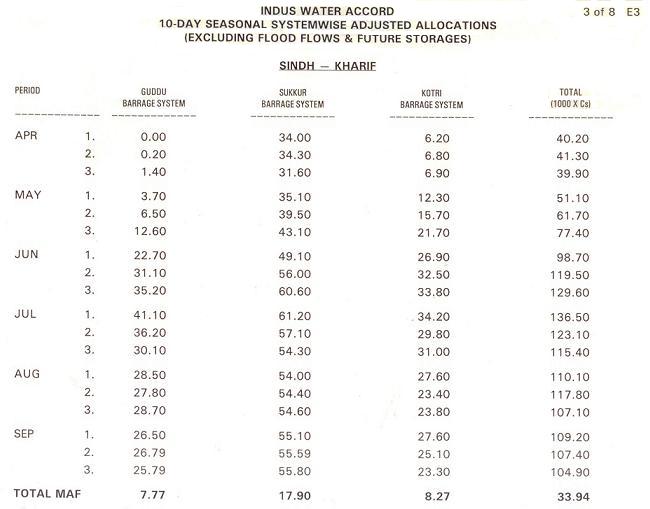
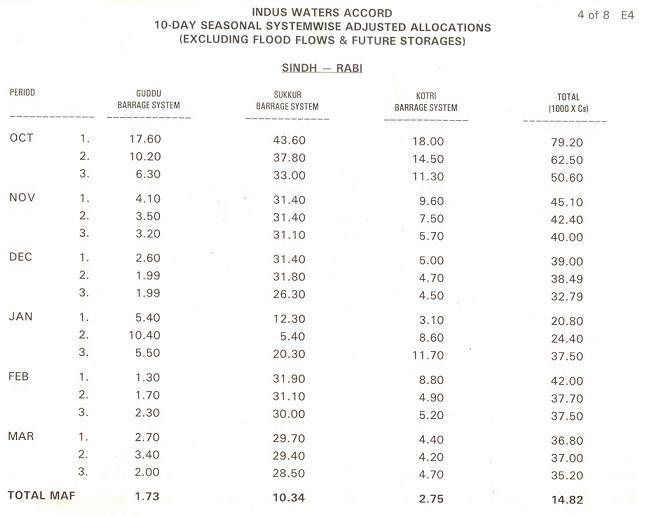
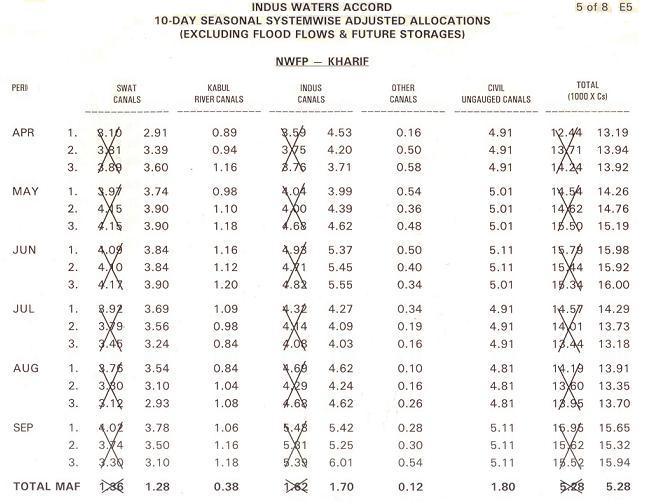
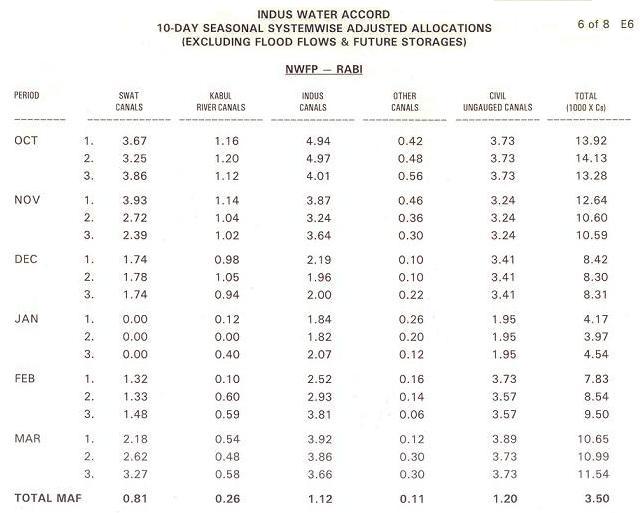
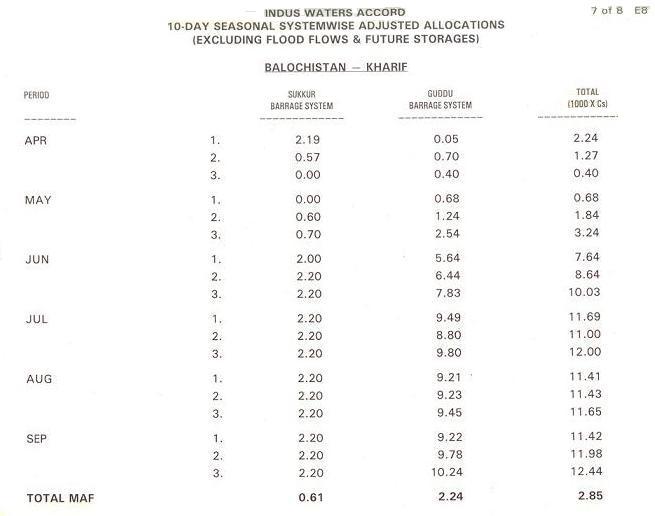
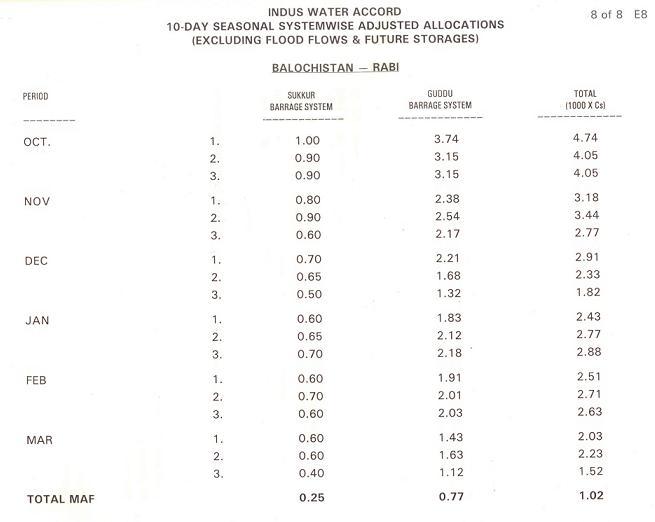
Actual Average System Uses 1977-1982





